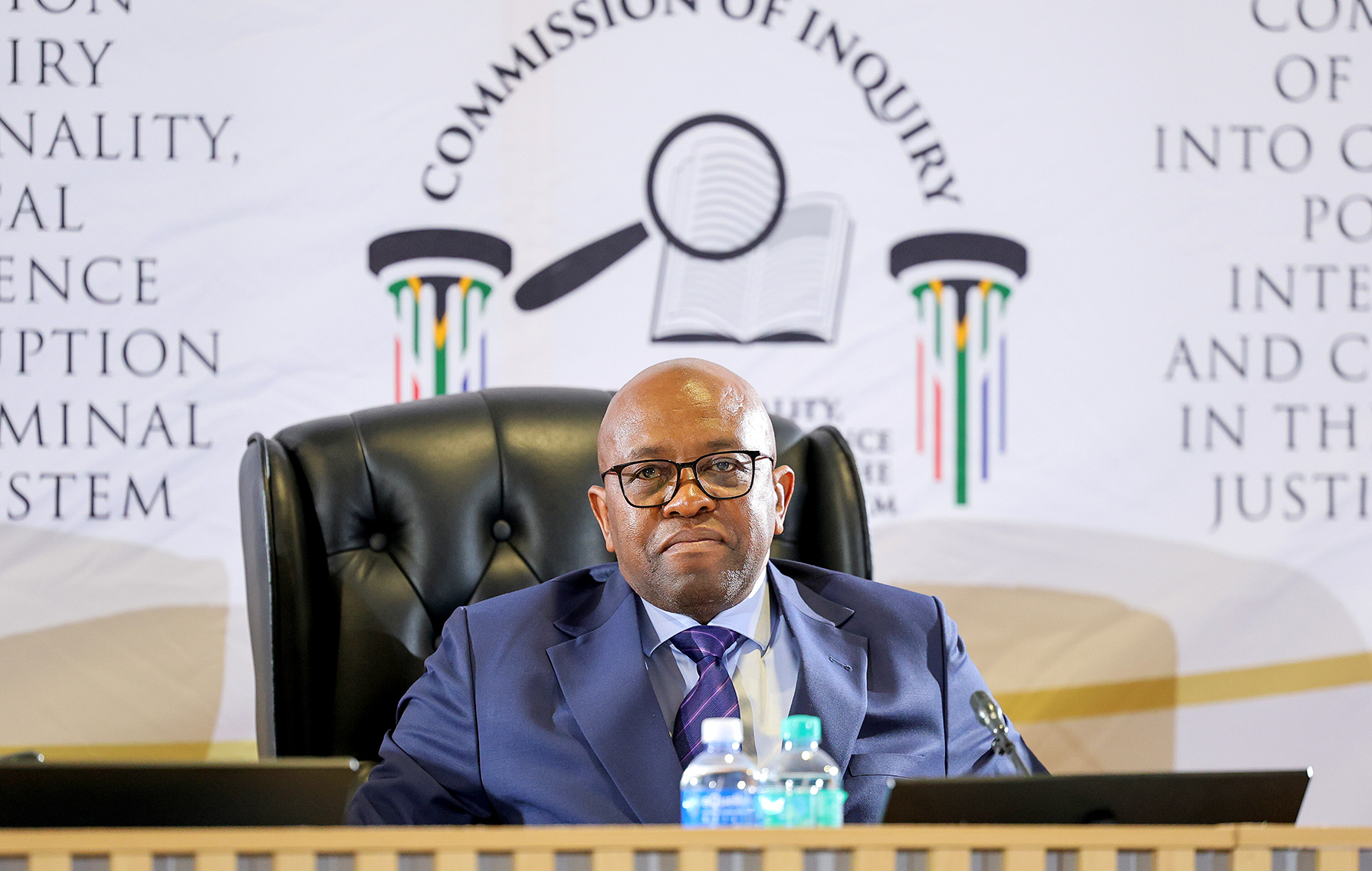This week’s proceedings of the Madlanga Commission probing police corruption were meant to take place entirely behind closed doors — but a last-minute agreement between evidence leaders and the media means that the public will still be able to follow the inquiry.
Daily Maverick and News24 had launched an urgent challenge to an application by the commission’s evidence leaders for a ruling that all witnesses for the next week be heard in-camera, due to the sensitive nature of the testimony and the possible safety threat to witnesses.
At the eleventh hour, an unusual compromise was reached: one that allows continued media coverage of proceedings while respecting the high stakes for witnesses.
If you had tuned in to the broadcasts of the inquiry on Tuesday morning, you would have seen a screen displaying the evidence being discussed, while one of the evidence leaders essentially played the part of the witness as a voice actor, relaying testimony to the commission after receiving it from the witness via an earpiece.
This solution is believed never to have been used before in South African proceedings of this nature, though it has been employed overseas.
Ruling will hold until Thursday
In the end, Justice Mbuyiseli Madlanga’s task on Tuesday morning was simply to read aloud the settlement agreed to by the evidence leaders and the lawyers for the media.
It stipulates that the witness giving testimony to the commission on Tuesday 14 October and Wednesday 15 October 2025 will do so as follows:
- The witness will testify remotely and off camera.
- The answers of the witness to questions posed by the evidence leaders will be repeated publicly through an intermediary whose voice will be broadcast live as s/he repeats the witness’ words.
- The witness’ anonymised statement with exhibits will be displayed live on screen as the witness testifies.
- The transcript of the witness’ testimony will be made publicly available after the witness has finished testifying.
As evidence leader Matthew Chaskalson summed it up to the commission on Tuesday morning: “In essence, all that is being withheld is the [anonymous] witness’ face and voice.”
This situation will also apply to the testimony of one of the witnesses due to testify between Monday 20 October and Wednesday 22 October.
Two further witnesses between this period will also testify remotely and off camera, but their evidence will not be heard through an intermediary. Instead, their own voices will be heard and broadcast live.
Evidence from two witnesses in dispute
For the time being, the only matter that the two parties have not agreed upon is what the situation will be with regards to a witness who is due to testify on Thursday 16 October and Friday 17 October “on matters which relate to ongoing criminal investigations”.
Attorney Charl du Plessis, who is acting for Daily Maverick and News24 in this matter, said he was hopeful that an agreement would be reached on this shortly.
Importantly, the final element of the agreement is that the evidence leaders will apply to the commission for permission to lead any other witnesses in-camera beforehand, and will inform the publication of such an application at least 72 hours before the witness is called.
Read more: Police inquiries — we, the people, are the grass being trampled
The greatest concern from the media applicants had been that if evidence leaders were permitted a blanket ban on coverage of the commission’s proceedings for more than a week, the public would have no information at all on not just the evidence being given, but also the nature of the witnesses or even the number of witnesses.
Du Plessis had argued that this could pave the way for a scenario where a figure as senior as President Cyril Ramaphosa could give testimony behind closed doors without the public having any sense of whether this secrecy was justified, or whether the president was being granted political protection.
As of lunch on Tuesday, it seemed that the only thing that could scupper the agreement might be technical difficulties — which saw evidence leader Adila Hassim eventually take over to read the anonymous witness’ statement into the record. DM





 Justice Mbuyiseli Madlanga at the Madlanga Commission Of Inquiry on Day 4 at Brigitte Mabandla Judicial College in Pretoria, South Africa. (Photo: Gallo Images / Luba Lesolle)
Justice Mbuyiseli Madlanga at the Madlanga Commission Of Inquiry on Day 4 at Brigitte Mabandla Judicial College in Pretoria, South Africa. (Photo: Gallo Images / Luba Lesolle)